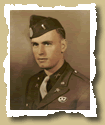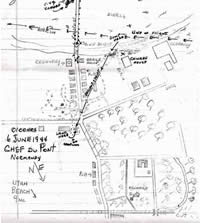 |
Robert Clinton Moss,
Jr
Lieutenant - H Co. - 508th Parachute Infantry Regiment - 82nd
A/B Div.
|
The 508th Prcht. Inf. left USA sometime
after Christmas, 1943. We landed at Belfast and made camp somewhere between
Coleraine and Port Stuart in Northern Ireland where it rains every day excepting
Sundays. After a month or so we crossed to England and settled at Nottingham,
one great place. This was early February, 1944. Weather had improved.
We made training jumps always at night and on one of these I went through
a thatched roof of a farmhouse and wound up swinging in a farmers bedroom.
He and wife were in the sack.
In April or May, in addition to my duties
as platoon leader, I was named liaison officer to the Air Force. This meant
I would handle the detail for jumps to be made by the third Battalion.
Toward the end of May, the Bn. CO. told me to go to a certain airfield (I
forget which) and set up a drop. No date was given. Then before I left, the
Bn. CO. said, after swearing me to secrecy, "This is the big one. We
are going."
I remember it was Whitsundide or WhitSunday that the regiment took off from
Nottingham in a double decker British busses and went to the field and bunked
in a hangar that I had arranged for us. It was enclosed with barbed wire.
Only special people go in or out. I could go out but had nowhere to go.
We were set to go on June 4th but the weather messed that up. Some rain, heavy
gusts but nothing like the coastal regions.
June 5, 1944, dawned bright and clear.
Late in the afternoon we began loading our equipment on the planes. (The 1st
& 3rd Bns. were at this field.) the British had double daylight time and
in that northern region it did not get absolutely dark until about midnight
so it was light when we finally took off. I have forgotten the time.
We flew south and west out over the ocean. It was dark and the formations
had tiny blue lights around the wing edges and down the fusilages, arranged
to be seen only by the other aircraft. We homed on a sub somewhere, turned
south for a spell then east and hit the west coast of Normandy on an axmuth
of 113 degrees.
We supposedly had a few minutes to go to drop zone and the red ready light
went on. All men stood up, hooked up and moved in position to jump. Flak at
night is magnified similar to flying over the fair grounds into the fireworks.
The plane began jumping from the concussion but I don't think we took and
hits.
We flew and flew and flew - and flew. We knew something was wrong. I could
no longer see the formation light of other planes. The guys were getting edgy
and that line was surging and pushing. And there was some profanity, I believe.
Then the crew chief came up to me and said: "Lieutenant, we can't find
the drop zone. We are lost. Do you want to go back to England? Gawd amighty!
Go back to England? Those guys would have thrown me out and jumped anyway
or killed me when we got back to England. I said, "Are we over France?"
He said, "Yes." I said, "Give us the green light, We're going."
I had a large, sharp, GI knife in a boot
holster with a lanyard to my belt, a carbine (.30 cal) and a .45 pistol which
was cocked and ready in a shoulder holster. Thus I departed the good old C-47.
I knew there was something bad on the ground but it didn't worry me particularly.
I was happy to get out of that plane. This feeling is shared by all troopers.
My chute opened as usual, I checked the
swing somewhat. A strong breeze was blowing and I knew I was moving fairly
fast in some direction. I was not going straight down. What looked large pasture
below me was really a flooded section of the Merderet river. I removed my
reserve chute and dropped it to have no interferrence when removing the back
pack on the ground. I knew we had jumped about 700 to 800 feet which is not
bad. Then I realized I was moving backwards. I could have turned my body to
come in forward but said to hell with it, I'll go in as the Good Lord permits.
The "pasture" was gone now and I could see houses below. I realized
I was coming in fast, mostly horizontal. More so than vertical. Then WHAMMMM'.
I had trained for this with that thatched roof. I was swinging in the corner
of a room. Bang-right wall, bang-left wall. Then I knew - nobody told me -
I had come through the roof of a stone barn. I saw the joists, about two feet
apart and up to a peak like any house roof.
I pulled the knife from my boot and slashed through the nylon suspension lines
that go from the shoulder to the parachute. I was now swinging by my left
shoulder and still banging the wall. Left right, left right.
 Then
I heard voices and I recognized the tongue. They were not French. A schmeisser
(German machine pistol, smaller rounds than our sub-machine gun) started firing
through the door and through the window of the barn but I was swinging behind
the window and not close to the door and they missed me. Then
I heard voices and I recognized the tongue. They were not French. A schmeisser
(German machine pistol, smaller rounds than our sub-machine gun) started firing
through the door and through the window of the barn but I was swinging behind
the window and not close to the door and they missed me.
I could make out two persons outside the barn and they were coming close.
I pulled my .45 out of the shoulder holster - it had a hair trigger and it
went off as I pulled it out. Remarkable I didn't shoot my arm off - and I
kept firing, nervous reaction, and just as I reach the door with my rapid
fire this German came in still firing and the .45 slug caught him somwhere
and knocked him up in the corner. A .45 is a rough damn gun. I did not see
this man move again. I grabbed the lanyard on my knife and pulled it up and
slashed the suspensions lines on the left side and dropped a foot or so to
the floor. I went down flat and crawled to the door. I saw the other one standing
about five or six feet away and shot him. He spun around and went backwards
and fell and lay there. Still on my hands and knees, I crawled trhough the
doorway (there was no door) around the side of the barn into a driveway to
a road behind the barn. There was gunfire but not right there. I dashed across
the road into what was an orchard and stopped to survey the situation in the
dark. I could not see more than thirty yards, if that.
Reconnaissance - that is a military positive
and it comes up front - reconnoiter - patrol - and that's what I did. There
were 17 or 19 men on my plane and we would have come down in a generally straight
line. I did not know about the river then. I was in the village of Chef du
Pont but did not know where I was.
I spent about one hour going from end to
end of that place which was spread out with several fields and many open places
along a main drag. No lights, no sign of habitation. The natives were lying
low. I found none of my boys. How much time went by I can't recall and I was
ready to leave the village and make toward some firing that had started up
I don't know just how far away. I could tell from the sound that our rifles
were firing.
Actually, I was heading cover behind fences,
posts, bushes - just like a good soldier doing it by the book. That was the
easy part. I was back at the orchard and I heard someone moving. The weeds
were about knee high. A normal pace through could make noise and I was tuned
for a pin drop.
I went down in a prone position, brought my carbine up on this figure I could
make out as he came toward me and - why I didn't take that perfect shot, only
God knows. Something held my finger and I snapped Halt! Right back came the
words "Lt. Moss." I said, "Damnit, Svenson, what the hell are
you doing walking though here like that? That's the way to get killed!"
The training officer, still training my men.
Now we were two, reinforced and ready.
We moved toward the river and the bridge. The bridge told me a lot. It had
to be held. Our job was to seal off the beaches. We start here.
Our armament consisted of one M-1 rifle, one carbine, two hand grenades apiece,
amunition aplenty, sulphur powder and a bandage apiece and-and-and - each
of us had a five pound land mine in our musett bag hanging over our bellies.
We could stop any tank that tried to cross.
Svenson and I found a spot at riverside just to the flank of the bridge, It
was hidden by trees but we could see out when light came. Best of all it muffled
the sound of fire and better yet, it hid the flash and smoke. We settled in
to hold that unnamed bridge.
Not quite daylight and Svenson was eying
the river and I was a few yards back watching our rear when I saw.
He was standing about fifty feet away, looking right past us. I saw him first.
Now we were three and most confident. That was because we didn't understand
the real situation at all.
At just about daylight, I caught a motion
behind us and challenged this Frenchman. I could see him trying to come around
a chicken house. For the first time I could see we were behind a house with
a back yard stretching to the river. I showed him the American Flag on my
shoulder and he seemed pleased. He spoke to me in French - I spoke to him
in English. We understoodnothing and he signaled and disappeared then returned
with a bottle of something that was "Ceeeda," the great Norman cider
we learned to love. Pluss a boiled egg for each of us.
Robert Clinton Moss, Jr. (September
06, 2007)
|


